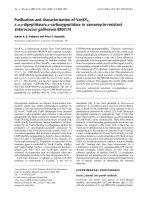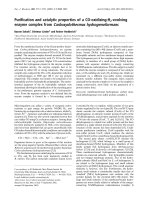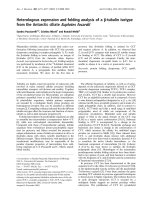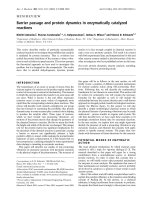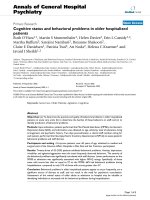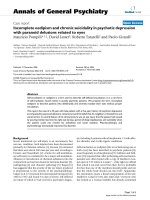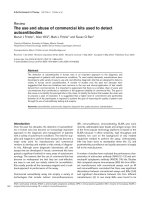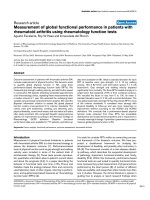Báo cáo y học: "ITGAV polymorphism and disease susceptibility in a Japanese rheumatoid arthritis population" ppsx
Bạn đang xem bản rút gọn của tài liệu. Xem và tải ngay bản đầy đủ của tài liệu tại đây (40.42 KB, 2 trang )
Page 1 of 2
(page number not for citation purposes)
Available online />A research article by Jacq and colleagues [1], recently
published in this journal, reported an association between
rheumatoid arthritis (RA) and the rs3738919-C allele in the
ITGAV gene, which encodes the α
v
subunit of the integrin
α
v
β
3
, in a European Caucasian population.
One feature of the pathophysiology of RA is the hyper-
angiogenesis observed in the synovial tissue and, along with
excess macrophages and T lymphocytes, α
v
β
3
ligands are
also abundant in synovial fluid [2]. As a key player in
angiogenesis [3], it has been suggested that ITGAV may be a
RA susceptibility gene. The linkage study also supports this
view because the 2q31 region containing ITGAV exhibited
linkage in a dense genome scan [4].
Although the European association study by Jacq and
colleagues [1] indicated ITGAV to be a new minor RA
susceptibility gene, a replication study conducted in a
population of different ethnicity is helpful in exploring whether
the association is caused by a common variance through
various ethnic groups. We therefore undertook a large
population-based study to investigate the association
between ITGAV and RA in a Japanese population.
DNA samples were obtained from 1,504 Japanese RA
patients and 449 population control individuals [5].
Genotypes were determined using the TaqMan method, in
accordance with the manufacturer’s instructions (Applied
Biosystems, Tokyo, Japan). Table 1 shows the genotype
distributions and allelic frequencies of patients and control
individuals. Unlike the European population, the rs3738919-
C allele was more frequent in control individuals in our
Japanese population, and no significant differences were
observed in allele frequencies for Japanese RA patients and
control individuals (0.908 and 0.922, respectively).
There are several factors that must be accounted for when a
study fails to corroborate a previously identified association.
One of these is an ethnicity-specific effect. Ethnic differences
can result in differences in allele frequencies, and the genetic
background of the disease itself may vary between ethnic
groups. Another issue that must be considered is that,
usually, negative association studies of a target gene outside
the HLA region lack sufficient power to detect the genetic
effect because the disease-associated genes outside the
region may be associated with limited relative risk for disease
susceptibility. While considering the odds ratio of Jacq et
Letter
ITGAV
polymorphism and disease susceptibility in a Japanese
rheumatoid arthritis population
Noriko Iikuni, Shu Kobayashi, Katsunori Ikari, Taisuke Tomatsu, Masako Hara, Hisashi Yamanaka,
Naoyuki Kamatani and Shigeki Momohara
Institute of Rheumatology, Tokyo Women’s Medical University, 10-22 Kawada, Tokyo, 162-0054 Japan
Corresponding author: Katsunori Ikari,
Published: 31 October 2007 Arthritis Research & Therapy 2007, 9:405 (doi:10.1186/ar2303)
This article is online at />© 2007 BioMed Central Ltd
See related research article by Jacq et al.,
and related editorial by Ahnert and Kirsten, />Table 1
Distribution of
ITGAV
rs3738919 genotypes in Japanese rheumatoid arthritis patients and control individuals
Genotype C versus A CC + CA vs. AA
CC CA AA Total MAF OR (95% CI) P
a
OR (95% CI) P
a
Patients 1,221 259 8 1,488 0.092 1.20 (0.91 to 1.60) 0.23 0.60 (0.16 to 2.72) 0.49
Controls 380 62 4 446 0.078
The distribution of the genotypes followed the Hardy-Weinberg equilibrium for both groups.
a
P values were obtained using Fisher’s exact test (R
version 2.4.1). CI, confidence interval; MAF, minor allele frequency; OR, odds ratio.
Page 2 of 2
(page number not for citation purposes)
Arthritis Research & Therapy Vol 9 No 5 Iikuni et al.
al.’s study [1], our study was designed to have sufficient
power to detect the effect of the ITGAV gene (> 0.96;
number of cases = 1504, number of controls = 449, OR in
the original French study [1] = 1.94, frequency of
rs3738919-A allele in the controls = 0.078, significance level
= 0.05). However, when the odds ratio is under 1.67, the
power is limited to below 0.8, and this may represent a study
limitation.
Despite its association with RA in Caucasian populations, an
association of the ITGAV gene with RA patients in the
Japanese was not observed. Further studies in other ethnic
groups are necessary to draw definite conclusions.
Competing interests
The authors declare that they have no competing interests.
References
1. Jacq L, Garnier S, Dieude P, Michou L, Pierlot C, Migliorini P,
Balsa A, Westhovens R, Barrera P, Alves H, et al.: The ITGAV
rs3738919-C allele is associated with rheumatoid arthritis in
the European Caucasian population: a family-based study.
Arthritis Res Ther 2007, 9:R63.
2. Friedlander M, Brooks PC, Shaffer RW, Kincaid CM, Varner JA,
Cheresh DA: Definition of two angiogenic pathways by distinct
alpha v integrins. Science 1995, 270:1500-1502.
3. Eliceiri BP, Cheresh DA: The role of alphav integrins during
angiogenesis: insights into potential mechanisms of action
and clinical development. J Clin Invest 1999, 103:1227-1230.
4. Osorio YFJ, Bukulmez H, Petit-Teixeira E, Michou L, Pierlot C,
Cailleau-Moindrault S, Lemaire I, Lasbleiz S, Alibert O, Quillet P,
et al.: Dense genome-wide linkage analysis of rheumatoid
arthritis, including covariates. Arthritis Rheum 2004, 50:2757-
2765.
5. Iwamoto T, Ikari K, Inoue E, Toyama Y, Hara M, Yamanaka H,
Tomatsu T, Momohara S, Kamatani N: Failure to confirm associ-
ation between PDCD1 polymorphisms and rheumatoid arthri-
tis in a Japanese population. J Hum Genet 2007, 52:557-560.
